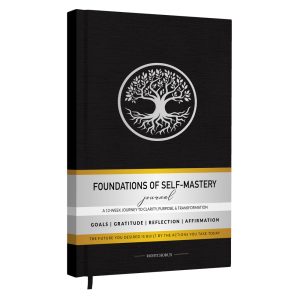Journaling has become one of the fastest-growing practices in the modern self-development movement, and a self help journal often serves as the cornerstone of this personal evolution.
In a world brimming with distractions and daily stressors, carving out a few intentional minutes with pen and paper can offer clarity, resilience, and real transformation.
Whether you’re looking to rewrite limiting beliefs, sharpen emotional awareness, or build lasting habits, journaling is a scientifically validated practice that meets you where you are.
In this blog post, we’ll explore how a self help journal can help you unlock measurable growth and fulfillment.
We’ll also introduce the Foundations of Self-Discovery & Mastery Journal, a guided tool thoughtfully designed to support your path toward clarity, emotional intelligence, and lasting change.
Foundations of Self Discovery & Mastery Journal: A 13-Week Personal Development Journal System
$29.95
The Foundations of Self Discovery…
Table of Contents
Why a Self Help Journal is the Cornerstone of Personal Growth
A self help journal is more than just a notebook—it’s a psychological mirror that allows us to track, reflect on, and ultimately shape our internal landscape.
Neuroscience confirms that writing activates regions of the brain responsible for memory, regulation, and problem-solving, making journaling not just therapeutic—but transformative.
When you commit to consistent journaling, you develop deeper self-awareness, enabling you to respond to life with intention rather than reaction.
This shift is what makes journaling such a powerful force in personal growth.
Let’s explore the psychological foundation behind this tool and how recorded reflection cultivates breakthrough shifts.
The Psychology Behind Self-Reflection
Engaging in daily self-reflection has profound effects on mental clarity and emotional well-being.
Writing allows your brain to process thoughts more slowly and more deeply, which fosters better self-understanding.
According to studies on expressive writing, journaling can reduce symptoms of anxiety and depressive rumination.
Self-reflection stimulates the prefrontal cortex, encouraging:
- Stronger emotional regulation
- Enhanced problem-solving and decision-making skills
- Long-term cognitive restructuring through neuroplasticity
- Reduction in intrusive thoughts and psychological stress
Over time, self reflection leads to measurable increases in optimism and resilience.
It’s why tools like the Foundations of Self-Discovery & Mastery Journal combine affirmations, quotes, and thoughtful prompts—these elements strengthen positive neural pathways and reframe limiting patterns.
Building Self-Awareness Through Consistent Journaling
Self-awareness is a cornerstone of emotional intelligence. Through journaling, we can identify patterns—like unhelpful inner dialogue or inconsistent values—and course-correct.
Consistency helps you track progress, make incremental adjustments, and build emotional fluency.
Patterns to notice in your journal entries include:
- Recurring limiting beliefs or negative thinking
- Energy highs and low points during the week
- Relationship dynamics and communication triggers
- Personal definitions of success and fulfillment
By recording your thoughts regularly, you capture subtle shifts and insights that would otherwise be forgotten.
The structured approach within the Foundations of Self-Discovery & Mastery Journal allows you to revisit goals and recurring themes throughout a 13-week journey, reinforcing your commitment to intentional growth.
Foundations of Self Discovery & Mastery Journal: A 13-Week Personal Development Journal System
$29.95
The Foundations of Self Discovery…
How to Use a Self Help Journal for Daily Clarity and Focus

Clarity begins with habit. Using a self help journal—especially in the morning and evening—builds a routine that aligns your actions with your core values.
When you know what you want and how you feel, you can start each day grounded and end it feeling whole.
Consistency over perfection is key, and adding just 10 intentional minutes can reframe your entire mindset.
Here’s how to fully engage with your journal at both ends of your day:
Morning Intention Setting
Starting your day consciously shifts your mind from passive to proactive. Morning prompts prime your brain for focus, gratitude, and achievement.
Reflective questions such as “What am I grateful for today?” or “What is my intention?” give your brain a subconscious script to follow.
Advantages of morning journaling include:
- Clear focus for the day ahead
- Emotional regulation before external input
- Increased motivation through goal visualization
- Elevated state of gratitude and priming for joy
The Foundations of Self-Discovery & Mastery Journal includes thoughtful morning spreads featuring curated affirmations, motivational quotes, and gratitude prompts—all designed to align your mindset with your highest priorities.
Evening Reflections for Integration
Evening journaling invites closure. You not only reflect on what you did, but explore how you felt and what you learned. It’s an act of emotional integration.
Key benefits of end-of-day journaling include:
- Preventing stress buildup through reflection
- Recognizing personal wins
- Extracting lessons from challenges
- Shaping tomorrow’s mindset with intention
The nightly prompts in the Foundations of Self-Discovery & Mastery Journal ask, “What went well? What could I improve?”—these questions facilitate daily growth and help reinforce a mindset of self-compassion and evolution.
Foundations of Self Discovery & Mastery Journal: A 13-Week Personal Development Journal System
$29.95
The Foundations of Self Discovery…
Designing Your Personalized Self Help Journal Practice
Not every journal practice looks the same—and that’s the beauty of it. Creating a personalized journaling habit ensures consistency because it’s built around your lifestyle, personality, and goals.
Whether you’re someone who prefers digital tools or finds meaning in pen-to-paper rituals, there’s a structure that works for you.
Choosing the Right Journal Format for You
Your journaling format should align with your preferences and goals. Are you looking to cultivate structure, or do you thrive in freeform expression?
Options to consider:
- Digital apps for journaling on the go
- Paper journals for deeper emotional resonance
- Prompted journals for guided introspection
- Freestyle for spontaneous creativity
The Foundations of Self-Discovery & Mastery Journal offers a beautiful balance with structured prompts, free-writing note pages, and inspirational frameworks.
Designed for both beginners and advanced journalers, it flexes to fit your evolving needs.
Creating a Journaling Routine That Sticks
A strong practice requires habit reinforcement. To make journaling second nature, use proven habit-anchoring strategies.
Here are some routine-building tips:
- Journal right after brushing your teeth or during morning coffee
- Pair journaling with meditation or breathwork
- Keep your journal visible to act as a cue
- Start small: just 5 minutes per session
Using the Foundations of Self-Discovery & Mastery Journal daily helps link your journaling habit with reflection, goal setting, and mindfulness—making it easier to stay consistent.
Foundations of Self Discovery & Mastery Journal: A 13-Week Personal Development Journal System
$29.95
The Foundations of Self Discovery…
The Self Help Journal as a Mindfulness Practice

Mindfulness is the art of noticing—and journaling is one of the best mindfulness tools available.
When you pause to write, you venture inward and bring clarity to your inner experience. This fosters a deeper connection with yourself and your surroundings, reducing reactivity and increasing intention.
Mindful Writing to Cultivate Presence
Mindful journaling is rooted in the practice of slow, intentional writing. Slowing down your thoughts reduces emotional reactivity and strengthens your ability to remain present in the moment.
Benefits of mindful writing include:
- Grounding the nervous system
- Enhancing awareness of physical and emotional cues
- Building compassion and empathy toward oneself
- Becoming more centered in decision-making
Enhance the ritual by incorporating breathwork, a calming tea, or soft music. Tools like the Foundations of Self-Discovery & Mastery Journal support this practice with affirming quotes and gentle reflection questions that naturally orient you toward inner peace.
Noticing Patterns & Emotional Triggers Mindfully
Becoming aware of your emotional landscape helps you make better choices. Journaling emotions helps externalize your inner world, giving you a chance to name, navigate, and soothe difficult feelings.
Use your journal to:
- Track emotional patterns, identify triggers
- Connect past experiences to current reactions
- Notice resistance, approvals, and needs
- Shift from judgment to curiosity
The Foundations of Self-Discovery & Mastery Journal includes mood-based check-ins and affirmations that support emotional self-tracking and regulation, turning awareness into calm empowerment.
Foundations of Self Discovery & Mastery Journal: A 13-Week Personal Development Journal System
$29.95
The Foundations of Self Discovery…
Using a Self Help Journal to Set and Track Goals
A self help journal also serves as a strategic tool for goal setting. Writing your intentions programs the mind to prioritize progress and activates what psychologists call the “generation effect”—putting pen to paper boosts memory and execution.
Clarity in Goal Formation
When goals live only in your head, they’re easy to defer. But writing them down makes them vivid, measurable, and intentional.
Use the SMART system: Specific, Measurable, Achievable, Relevant, Time-bound.
Ideas for strategic journaling:
- Quarterly vision-mapping
- Daily micro-goals
- Values-based intentions
- Progress metrics
The Foundations of Self-Discovery & Mastery Journal includes goal-setting templates inside the “Foundations of Self-Mastery” section, helping you clarify your priorities and break them into daily actions.
Tracking Progress with Intention
Tracking your wins enforces a feedback loop. It reminds you of your progress and supports motivation even on tough days.
Track your progression by:
- Listing achievements each week
- Logging moments of effort, not just outcome
- Celebrating shifts in mindset and resilience
- Reflecting on detours as lessons, not failures
This journal’s 13-week format offers plenty of checkpoints and space for reflective review so that your goals feel like an ongoing journey, not a pressure-filled finish line.
Foundations of Self Discovery & Mastery Journal: A 13-Week Personal Development Journal System
$29.95
The Foundations of Self Discovery…
Turning Self Reflection Into Tangible Growth

Journaling isn’t only powerful in concept—its impact is measurable. Real people have used their self help journal practices to transform careers, relationships, and inner lives.
By shifting from awareness to aligned action, journaling becomes a growth catalyst—not just a coping tool.
From Insight to Action
Insight alone isn’t enough. True growth is built when insight is paired with action. Reviewing your journal entries weekly helps extract patterns and plan better responses in real-time.
Ways to apply insights:
- Create an action list from weekly reflections
- Set mini-challenges based on mindset shifts
- Use your journal as an accountability log
- Reflect on repeating lessons and what needs to change
The Foundations of Self-Discovery & Mastery Journal includes designated “Next 13-Week Planning” and reflection pages that make action-planning intuitive, bridging the gap between knowing and doing.
Celebrating Milestones, Not Just Outcomes
Growth isn’t just found in achievement—it’s in the journey. Your journal is a living archive of how far you’ve come.
Celebrate by:
- Creating a gratitude vision board
- Writing letters to your future self
- Tracking emotional breakthroughs and mindset upgrades
- Noting progress even in the midst of struggle
With closing pages for “Achievement Celebration” and “Letter to Future Me,” the Foundations of Self-Discovery & Mastery Journal invites you to reflect and rejoice at each chapter of your growth.
Conclusion
Incorporating a self help journal into your daily life isn’t just a habit—it’s a proven path to clarity, focus, and self-actualization.
Whether you’re reflecting on your thoughts, planning your goals, or restoring emotional balance, journaling holds the power to guide and ground you.
The Foundations of Self-Discovery & Mastery Journal offers a thoughtfully designed journey to turn your reflections into real transformation, with prompts, templates, and encouragement every step of the way.
Give yourself the gift of introspection and watch your self-awareness deepen, your goals sharpen, and your life shift toward purpose, one page at a time.
Frequently Asked Questions (FAQs)
A self help journal is a personal-growth tool designed to support emotional awareness, mental clarity, and goal setting. It typically includes prompts, reflection questions, and structured entries that guide you to understand yourself better and make intentional life changes.
Consistency is more important than frequency. Aim for at least 5–10 minutes a day or try writing three times a week. The goal is to create a consistent rhythm that nurtures reflection without pressure.
Use prompts to spark clarity. Write about what you’re grateful for, what challenged you today, or any feelings you want to unpack. The Foundations of Self-Discovery & Mastery Journal includes built-in prompts and affirmations so you never feel lost.
Journaling is proven to reduce stress, elevate mood, and foster emotional regulation. It helps you name emotions, reframe negative thoughts, and cultivate appreciation—all of which positively affect your mental health.
Yes, it’s perfect for beginners. The journal offers guided prompts, affirmations, and templates that walk you through a structured and supportive 13-week growth journey.
Absolutely. By setting daily goals and reflecting on your priorities, journaling helps you stay aligned and efficient. The Foundations of Self-Discovery & Mastery Journal includes features like “Today’s Goal” and “Tomorrow’s Next Step” to keep focus sharp.
A planner organizes your schedule; a journal organizes your thoughts and emotions. The Foundations of Self-Discovery & Mastery Journal blends the two, offering both daily structure and deep reflection.
Yes. The act of writing slows your mind and soothes your nervous system. Journaling daily can foster a sense of control and decrease overwhelming thoughts.
Both are effective. Handwriting tends to foster emotional depth, while digital tools offer convenience. Choose what makes you feel at ease—but for deeper engagement, pen and paper often come out ahead.
When practiced consistently and intentionally, absolutely. Journaling has helped countless people uncover purpose, navigate transitions, and stay grounded in their truth. It can do the same for you.







